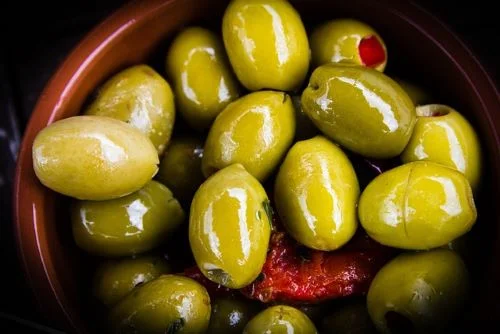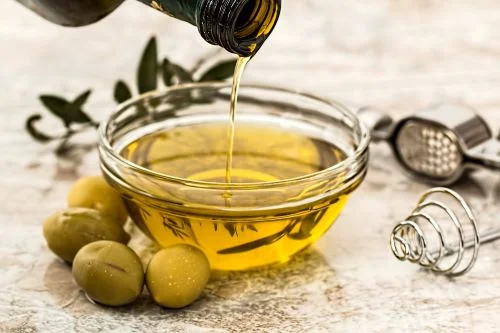Benefits of olives!
Olives offer a multitude of benefits for various aspects of health and well-being. They are packed with essential nutrients, including healthy fats, antioxidants, vitamins, and minerals, making them a nutritious and delicious option.
Introduction:
Olives, those small and mighty fruits adored by epicureans and health enthusiasts alike, have captured the hearts and palates of people across the globe. These little orbs pack a flavorful punch that can elevate any dish, from zesty salads to mouthwatering pizzas. But beyond their culinary appeal, olives have an impressive array of health benefits that make them more than just a delightful addition to your plate – they’re bona fide powerhouses of nutrition.

Picture this: a group of Mediterranean gods convening on Mount Olympus, each holding a small, mysterious fruit in their hands. Zeus, with a twinkle in his eye, proclaims, “Behold, the olive! This humble fruit shall grace the tables of mortals, bringing them not only joy but also a host of health benefits!” And thus, olives were bestowed upon us, mere mortals, to savor and reap their bountiful advantages.
But what makes olives so special? Well, let’s start with their nutritional value. These tiny treasures are packed with healthy fats, antioxidants, vitamins, and minerals that can do wonders for your well-being. Whether you’re a health-conscious individual or simply someone who appreciates the finer things in life, olives have something for everyone.
Now, don’t be fooled by their size – olives may be small, but they wield an impressive array of benefits. From promoting heart health to supporting brain function and aiding digestion, olives have a remarkable knack for making your body and taste buds dance with joy. So, let’s embark on a journey to unravel the secrets of these little green and black marvels, discovering their tantalizing flavors and the abundant health benefits they bestow upon those wise enough to indulge.
Get ready to be captivated by the allure of olives as we delve into their many remarkable qualities, from their nutrient-packed composition to their extraordinary impact on our well-being. Prepare your taste buds for an adventure and embrace the olive revolution – because once you uncover the hidden treasures within these delightful fruits, you’ll never look at them the same way again.
- Benefits of olives!
- Introduction:
- 1. Benefits of olives for skin:
- 2. Benefits of olives for hair:
- 3. Benefits of olives for weight loss:
- 4. Benefits of olives for weight gain:
- 5. Benefits of olives for GYM:
- 6. Benefits of olives for brain:
- 7. Benefits of olives for teeth.
- 8. Benefits of olives for male.
- 9. Benefits of olives for female.
- 10. Benefits of olives for kids.
- 11. Benefits of olives for eyes.
- 12. Benefits of olives for face.
- 13. Benefits of olives for digestion.
- 14. Benefits of olives for breakfast.
- 15. Benefits of olives for fun.
- 16. Extra benefits of Olives.
- Conclusion:
- #Frequently asked questions | FAQs on olives.
1. Benefits of olives for skin:

Olives, those small and versatile fruits that grace our tables, not only offer a delightful culinary experience but also bring a host of benefits to our skin. Packed with essential nutrients and natural compounds, olives can work wonders when incorporated into your skincare routine. So, let’s explore the incredible benefits of olives for your skin and discover how they can help you achieve a radiant and healthy complexion.
- Nourishes and Hydrates: Olives are rich in healthy fats, including monounsaturated fats and omega-3 fatty acids, which are beneficial for skin health. These fats help to nourish and moisturize the skin, preventing dryness and maintaining its natural moisture barrier. Regular use of olive-based skincare products or applying olive oil directly to the skin can help keep it hydrated, supple, and soft.
- Anti-Aging Properties: The presence of powerful antioxidants, such as vitamin E and polyphenols, in olives makes them effective in combating the signs of aging. These antioxidants help to neutralize free radicals, which are responsible for causing premature aging and skin damage. By reducing oxidative stress, olives can minimize the appearance of fine lines, wrinkles, and age spots, giving your skin a more youthful and radiant look.
- Soothes and Calms Irritation: Olives possess anti-inflammatory properties that can soothe and calm irritated or inflamed skin. Whether you’re dealing with redness, acne, or sensitive skin conditions like eczema or psoriasis, the soothing properties of olives can help alleviate discomfort and promote skin healing. Applying olive oil topically can provide relief and reduce inflammation, leaving your skin feeling calm and balanced.
- Improves Skin Tone and Texture: The natural acids found in olives, such as oleic acid and palmitic acid, help to exfoliate and renew the skin’s surface. Regular use of olive-based products can help improve skin texture by gently removing dead skin cells and promoting a smoother, more even complexion. Olives also contain vitamin A, which aids in skin cell regeneration, resulting in a brighter and healthier appearance.
- Protects Against Environmental Damage: The antioxidants present in olives offer protection against environmental damage, such as sun exposure and pollution. They help to neutralize the harmful effects of free radicals caused by UV radiation and environmental pollutants, which can lead to skin damage and premature aging. By incorporating olives into your skincare routine, you can fortify your skin’s defense against external aggressors and maintain its youthful glow.
- Whether you choose to use olive oil directly on your skin, incorporate olive-based skincare products, or indulge in the occasional olive-based facial mask, the benefits of olives for your skin are plentiful. From nourishing and hydrating to protecting and rejuvenating, olives offer a natural and holistic approach to skincare. So, embrace the power of olives and unlock their potential to help you achieve a healthy, radiant complexion.
- Please note that while olives can be beneficial for the skin, individual skin types may react differently. It’s always a good idea to perform a patch test before applying any new skincare product or ingredient to ensure compatibility and avoid any potential allergic reactions or sensitivities.
FAQs:
2. Benefits of olives for hair:

Olives, those versatile fruits celebrated for their culinary and skincare benefits, also offer a range of advantages when it comes to hair care. Packed with essential nutrients and natural compounds, olives can nourish and revitalize your hair, promoting its health and enhancing its appearance. Let’s explore the remarkable benefits of olives for your hair and discover how they can contribute to luscious locks.
- Moisturizes and Conditions: Olives are rich in healthy fats and natural oils, making them an excellent natural moisturizer and conditioner for your hair. The emollient properties of olive oil penetrate the hair shaft, providing deep hydration and nourishment from within. This helps combat dryness, frizz, and brittle hair, leaving your locks feeling soft, smooth, and more manageable.
- Enhances Shine and Luster: The moisturizing properties of olives also contribute to enhanced shine and luster in your hair. By providing essential hydration, olives help seal the cuticle layer, reducing frizz and creating a smoother surface that reflects light more effectively. Regular use of olive oil or olive oil-based hair products can add a beautiful sheen to your tresses, making them appear healthier and more radiant.
- Strengthens and Prevents Breakage: Olives contain nutrients like vitamin E, antioxidants, and fatty acids, which help strengthen the hair shaft and promote hair elasticity. By fortifying the strands, olives can help prevent breakage and minimize split ends. This is particularly beneficial for those with dry or damaged hair or for individuals who frequently use heat styling tools or chemical treatments.
- Stimulates Hair Growth: The antioxidants and nutrients found in olives contribute to a healthy scalp environment, which is vital for optimal hair growth. They help improve blood circulation to the scalp, promoting a nourished and oxygenated environment for the hair follicles. A healthy scalp can support the growth of stronger and thicker hair, making olives a potential ally in your quest for luscious locks.
- Soothes Scalp and Reduces Irritation: Olives possess anti-inflammatory properties that can help soothe and calm an irritated scalp. Whether you’re dealing with dryness, itchiness, or scalp conditions like dandruff, the soothing properties of olives can provide relief and restore balance to your scalp. Applying olive oil or olive oil-based treatments to the scalp can help alleviate discomfort and promote a healthier scalp environment.
Incorporating olives into your hair care routine can be as simple as using olive oil as a hair mask, conditioner, or even as a leave-in treatment. Alternatively, you can look for hair products that contain olive oil as a key ingredient. Embrace the nourishing power of olives, and let them work their magic on your hair, leaving you with beautiful, hydrated, and vibrant locks.
Please note that individual results may vary, and it’s important to consider your hair type and any specific sensitivities before incorporating new products into your hair care routine.
FAQs:
Remember, maintaining a healthy hair care routine, eating a nutritious diet, and addressing any underlying causes of hair loss or thinning are essential for optimal hair health.
3. Benefits of olives for weight loss:

Olives, those delectable fruits that enhance our meals, can also play a role in supporting weight loss efforts. While olives are relatively high in calories and should be consumed in moderation, they offer several benefits that can contribute to a healthy weight management plan. Let’s explore the benefits of olives for weight loss and how they can be incorporated into a balanced diet.
- Satiety and Portion Control: Olives are rich in healthy fats and dietary fiber, both of which contribute to feelings of satiety and help control appetite. The monounsaturated fats found in olives are known for their ability to promote feelings of fullness and satisfaction, which can prevent overeating and unnecessary snacking. Including olives as part of a meal or snack can help you feel more satisfied and reduce the likelihood of consuming excess calories.
- Nutrient Density: Olives pack a punch when it comes to nutritional value. They contain an array of vitamins, minerals, and antioxidants, which are essential for overall health and well-being. By incorporating olives into your diet, you can enjoy their nutritional benefits while keeping your calorie intake in check. Opting for nutrient-dense foods like olives can help support your weight loss journey by providing essential nutrients without excess calories.
- Flavor and Satisfaction: Olives add a burst of flavor to meals, which can make them more enjoyable and satisfying. When you enjoy your meals and find them satisfying, you’re less likely to feel deprived or seek out additional snacks or indulgences. Adding olives to salads, sandwiches, or pasta dishes can enhance the taste and provide a satisfying element to your meals, potentially reducing the urge to overeat.
- Balanced Macronutrient Profile: Olives contain a good balance of macronutrients, including healthy fats, carbohydrates, and a small amount of protein. This balanced profile helps provide sustained energy and supports stable blood sugar levels, which are important for maintaining a healthy weight. Including olives as part of a well-rounded meal can help ensure you’re getting a good mix of nutrients to support your weight loss goals.
- Versatility in Meal Planning: Olives offer versatility in meal planning, allowing you to explore a variety of healthy and delicious options. They can be used as toppings, garnishes, or ingredients in various recipes, providing flavor and texture without adding excessive calories. Experimenting with different olive varieties, such as green or black olives, can add excitement to your meals and keep your weight loss journey interesting.
- While olives can be a beneficial addition to a weight loss plan, it’s important to keep portion sizes in mind. Olives are relatively high in calories, so consuming them in moderation is key. Additionally, incorporating olives into a balanced diet that includes a variety of nutrient-dense foods and regular physical activity is essential for sustainable weight loss.
- Remember, it’s always a good idea to consult with a healthcare professional or a registered dietitian who can provide personalized guidance and support based on your specific needs and goals.
#Do olives help burn belly fat?
While olives can be part of a healthy diet, it’s important to clarify that there is no single food that can target or burn belly fat specifically. Burning belly fat requires a comprehensive approach that involves overall calorie control, regular physical activity, and a balanced diet.
However, olives can be beneficial for weight management due to their nutrient content and potential satiety-promoting effects. The healthy fats and fiber in olives can help you feel fuller for longer, which may aid in controlling your overall calorie intake and potentially support weight loss efforts.
To effectively reduce belly fat, it’s important to focus on overall body fat reduction through a combination of regular exercise, strength training, cardiovascular activity, and a healthy, balanced diet. Incorporating olives as part of a well-rounded eating plan that emphasizes whole foods, lean proteins, fruits, vegetables, and whole grains can contribute to overall weight management and support a healthy lifestyle.
Remember, it’s always beneficial to consult with a healthcare professional or a registered dietitian who can provide personalized guidance based on your specific needs and goals. They can help create a comprehensive plan that takes into account your individual circumstances and supports your journey towards a healthier weight.
FAQs:
4. Benefits of olives for weight gain:

When it comes to weight gain, olives may not be the most effective food choice due to their relatively low calorie content. However, they still offer some benefits that can support a healthy weight gain journey. Let’s explore the potential advantages of olives for weight gain:
- Nutrient Density: Olives are packed with essential nutrients, including healthy fats, vitamins, minerals, and antioxidants. While they may not contribute significantly to caloric intake, incorporating olives into your diet can provide important nutrients that support overall health and well-being, ensuring that your weight gain is achieved in a nourishing way.
- Healthy Fats: Olives are a good source of monounsaturated fats, which are considered heart-healthy fats. These fats provide a concentrated source of energy, with 9 calories per gram. Including olives and their oil in your diet can help increase calorie intake, which is essential for weight gain. Additionally, the healthy fats in olives can contribute to improved nutrient absorption and support hormone production.
- Versatility in Meal Planning: Olives can be a versatile ingredient that adds flavor and texture to various dishes. They can be included in salads, pasta, rice, sandwiches, or used as a topping or garnish. By incorporating olives into your meals, you can enhance the taste and increase the caloric content, helping to support weight gain.
- Appetite Enhancement: Olives, particularly those marinated or seasoned, can stimulate the appetite and make meals more enjoyable. If you have a low appetite or struggle to eat larger portions, including olives in your meals can help stimulate your taste buds and increase the overall enjoyment of your food, potentially leading to a higher calorie intake.
- Snacking Option: Olives can serve as a healthy snack for those looking to gain weight. They are portable, convenient, and can be easily incorporated into a snack routine. Pairing olives with other calorie-dense foods, such as nuts, seeds, or cheese, can create a nutritious and energy-dense snack option that supports weight gain.
While olives have their benefits, it’s important to remember that weight gain should be approached in a healthy and balanced manner. Consult with a healthcare professional or a registered dietitian who can provide personalized guidance based on your specific needs and goals. They can help you develop a comprehensive plan that includes a well-rounded diet, regular physical activity, and appropriate calorie intake to support healthy weight gain.
FAQs:
5. Benefits of olives for GYM:

Olives can offer some benefits for individuals who engage in regular gym workouts. While they may not be directly linked to gym performance, olives provide important nutrients that support overall health and well-being. Let’s explore some potential benefits of olives for individuals who frequent the gym:
- Nutrient Density: Olives are packed with essential nutrients, including healthy fats, vitamins, minerals, and antioxidants. These nutrients play a vital role in supporting overall health, which is important for individuals who engage in intense physical activity at the gym. Proper nutrition helps support energy levels, muscle recovery, and overall well-being.
- Healthy Fats: Olives are a source of monounsaturated fats, which are considered heart-healthy fats. These fats provide a concentrated source of energy, which can be beneficial for individuals who engage in rigorous workouts at the gym. Adequate fat intake is essential for hormone production, joint lubrication, and nutrient absorption.
- Antioxidants and Anti-Inflammatory Properties: Olives contain antioxidants, such as vitamin E and polyphenols, which help fight oxidative stress and inflammation in the body. Intense workouts at the gym can result in increased oxidative stress and inflammation. Including olives in your diet can provide antioxidant support, aiding in recovery and reducing exercise-induced inflammation.
- Flavor and Satisfaction: Olives can add flavor and texture to meals, making them more enjoyable and satisfying. When you enjoy your meals, you’re more likely to stick to a balanced diet that supports your fitness goals. Incorporating olives into your post-workout meals or snacks can enhance the taste and provide a satisfying element, potentially reducing the temptation to indulge in less healthy options.
- Versatility in Meal Planning: Olives offer versatility in meal planning, allowing you to explore a variety of healthy and delicious options. They can be used as toppings, garnishes, or ingredients in various recipes, providing flavor and nutritional benefits. Experimenting with different olive varieties can add excitement to your meals and keep your gym routine interesting.
While olives offer these benefits, it’s important to remember that overall nutrition, hydration, and a well-designed workout routine are key factors in maximizing gym performance. It’s advisable to consult with a healthcare professional, registered dietitian, or certified personal trainer who can provide personalized guidance based on your specific fitness goals and dietary needs. They can help you create a comprehensive plan that includes a balanced diet, appropriate nutrient timing, and optimal supplementation, if necessary, to support your gym endeavors.
FAQs:
6. Benefits of olives for brain:

Olives offer several potential benefits for brain health due to their nutrient content and antioxidant properties. Here are some of the ways olives can support brain health:
- Antioxidant Protection: Olives are rich in antioxidants, such as vitamin E and polyphenols. These compounds help protect the brain cells from oxidative stress and damage caused by free radicals. By reducing oxidative stress, olives may contribute to the long-term health and function of the brain.
- Anti-inflammatory Effects: Chronic inflammation in the brain has been associated with various neurodegenerative diseases, such as Alzheimer’s and Parkinson’s. Olives contain anti-inflammatory compounds that may help reduce inflammation in the brain, potentially protecting against age-related cognitive decline.
- Healthy Fats: Olives are a good source of monounsaturated fats, which are considered beneficial for brain health. These fats help maintain the integrity of cell membranes and support the communication between brain cells. Adequate fat intake is essential for optimal brain function.
- Nutrient Profile: Olives contain various nutrients that support brain health. They are a source of vitamin E, which has been linked to cognitive function and reduced risk of cognitive decline. Additionally, olives provide minerals like magnesium and zinc, which play roles in neurotransmitter function and cognitive processes.
- Mood and Mental Well-being: The healthy fats in olives can contribute to overall mental well-being. Omega-3 fatty acids, found in some varieties of olives, have been associated with improved mood and reduced risk of depression. Including olives as part of a balanced diet can help support emotional and mental health.
It’s important to note that while olives offer potential benefits for brain health, a comprehensive approach to brain health should include other lifestyle factors such as regular physical activity, adequate sleep, stress management, and a balanced diet rich in a variety of nutrients. As always, consulting with a healthcare professional or registered dietitian can provide personalized guidance based on your specific needs and health goals.
7. Benefits of olives for teeth.

Olives can offer some benefits for dental health due to their nutrient content and certain properties. Here are some potential benefits of olives for teeth:
- Antibacterial Properties: Olives contain compounds with antibacterial properties, such as polyphenols and flavonoids. These compounds may help inhibit the growth of bacteria in the mouth, including those associated with dental plaque and gum disease. By reducing the bacterial load in the mouth, olives can contribute to better oral hygiene and overall dental health.
- Saliva Stimulation: Chewing on olives can stimulate the production of saliva. Saliva plays a crucial role in maintaining oral health as it helps neutralize acid, rinse away food particles, and promote the remineralization of tooth enamel. Increased saliva flow can aid in the prevention of tooth decay and the maintenance of a healthy oral environment.
- Vitamin E and Antioxidants: Olives are a source of vitamin E and other antioxidants. These nutrients help protect the gums and oral tissues from oxidative damage caused by free radicals. Maintaining healthy gums is essential for strong teeth and overall oral health.
- Calcium and Phosphorus: Olives contain small amounts of calcium and phosphorus, which are minerals important for maintaining strong teeth and bones. These minerals contribute to the formation and remineralization of tooth enamel, helping to prevent tooth decay and strengthen teeth.
- Healthy Fat Content: Olives are a source of healthy fats, including monounsaturated fats. Consuming a balanced diet that includes healthy fats is beneficial for overall health, including oral health. Adequate fat intake supports the absorption of fat-soluble vitamins and helps maintain the integrity of oral tissues.
It’s important to note that while olives can provide some benefits for dental health, maintaining good oral hygiene practices such as regular brushing, flossing, and dental check-ups is essential. Additionally, minimizing the consumption of sugary and acidic foods and beverages is crucial for preventing tooth decay. If you have specific dental concerns, it’s advisable to consult with a dentist for personalized advice and recommendations.
8. Benefits of olives for male.

Olives offer several potential benefits for men’s health due to their nutrient content and antioxidant properties. Here are some ways olives can be beneficial for men:
- Heart Health: Olives are a good source of monounsaturated fats, which have been linked to improved heart health. Consuming healthy fats, such as those found in olives, can help reduce the risk of cardiovascular diseases, including heart disease and stroke. Olives also contain antioxidants that support overall heart health by reducing inflammation and oxidative stress.
- Testosterone Support: Olives contain healthy fats that are essential for hormone production, including testosterone. Testosterone is a key hormone for male reproductive health, muscle growth, bone density, and overall well-being. Including olives as part of a balanced diet that supports hormone balance can contribute to optimal testosterone levels.
- Antioxidant Protection: Olives are rich in antioxidants, such as vitamin E and polyphenols. These compounds help protect cells from oxidative stress and damage caused by free radicals. Antioxidants play a crucial role in maintaining overall health, including reproductive health and supporting the immune system.
- Nutrient Profile: Olives provide essential nutrients that support men’s health, including vitamins (such as vitamin E and vitamin K) and minerals (such as calcium and magnesium). These nutrients contribute to various bodily functions, including bone health, muscle function, and overall well-being.
- Weight Management: Olives, despite their relatively low calorie content, can be a satisfying addition to a meal. Including olives in a balanced diet can provide flavor and satisfaction, potentially reducing the temptation to indulge in less healthy options. Maintaining a healthy weight is important for overall health and can contribute to reduced risk of certain health conditions.
While olives offer potential benefits for men’s health, it’s important to remember that overall lifestyle factors such as regular physical activity, a balanced diet, stress management, and regular check-ups with healthcare professionals are crucial for maintaining optimal health. As always, it’s advisable to consult with a healthcare professional or registered dietitian for personalized guidance based on individual needs and health goals.
9. Benefits of olives for female.

Olives offer several potential benefits for women’s health due to their nutrient content and antioxidant properties. Here are some ways olives can be beneficial for women:
- Heart Health: Olives are a good source of monounsaturated fats, which have been linked to improved heart health. Consuming healthy fats, such as those found in olives, can help reduce the risk of cardiovascular diseases, including heart disease and stroke. Olives also contain antioxidants that support overall heart health by reducing inflammation and oxidative stress.
- Bone Health: Olives contain minerals like calcium and magnesium, which are important for maintaining strong bones. Adequate intake of these minerals is essential for women, especially during menopause when bone density tends to decline. Including olives as part of a balanced diet can contribute to the overall nutritional support needed for maintaining bone health.
- Antioxidant Protection: Olives are rich in antioxidants, such as vitamin E and polyphenols. These compounds help protect cells from oxidative stress and damage caused by free radicals. Antioxidants play a crucial role in maintaining overall health, supporting the immune system, and reducing the risk of chronic diseases.
- Nutrient Profile: Olives provide essential nutrients that support women’s health, including vitamins (such as vitamin E and vitamin K) and minerals (such as iron and folate). These nutrients contribute to various bodily functions, including reproductive health, energy production, and overall well-being.
- Weight Management: Olives, despite their relatively low calorie content, can be a satisfying addition to a meal. Including olives in a balanced diet can provide flavor and satisfaction, potentially reducing the temptation to indulge in less healthy options. Maintaining a healthy weight is important for overall health and can contribute to reduced risk of certain health conditions.
- Skin Health: Olives contain healthy fats and antioxidants that can support skin health. The vitamin E content in olives helps nourish the skin and protect it from oxidative damage. Including olives in the diet can contribute to overall skin health and radiance.
While olives offer potential benefits for women’s health, it’s important to remember that overall lifestyle factors such as regular physical activity, a balanced diet, stress management, and regular check-ups with healthcare professionals are crucial for maintaining optimal health. As always, it’s advisable to consult with a healthcare professional or registered dietitian for personalized guidance based on individual needs and health goals.
10. Benefits of olives for kids.

Olives can offer several potential benefits for kids’ health due to their nutrient content and antioxidant properties. Here are some ways olives can be beneficial for children:
- Nutrient Dense: Olives are packed with important nutrients that support children’s growth and development. They contain vitamins such as vitamin E, vitamin K, and vitamin A, which are essential for healthy bones, vision, and immune function. Olives also provide minerals like calcium, iron, and magnesium, which are important for bone health, red blood cell production, and overall well-being.
- Antioxidant Protection: Olives are rich in antioxidants, such as vitamin E and polyphenols. These antioxidants help protect cells from oxidative stress caused by free radicals. Including olives in a child’s diet can contribute to their overall antioxidant intake, supporting their immune system and reducing the risk of chronic diseases.
- Healthy Fats: Olives contain monounsaturated fats, which are considered healthy fats. These fats are an important energy source for children and are essential for their growth and development. Healthy fats also support brain development, hormone production, and the absorption of fat-soluble vitamins.
- Taste and Texture: Olives can introduce children to new flavors and textures, promoting their palate development and expanding their food preferences. Encouraging children to try olives as part of a varied diet can help develop their taste for different foods and contribute to a well-rounded eating pattern.
- Snack Option: Olives can be a convenient and nutritious snack option for kids. They are naturally portioned and can be included in packed lunches, picnics, or enjoyed as part of a balanced snack. Olives offer a satisfying combination of flavors and can be a healthier alternative to processed snacks that are often high in added sugars and unhealthy fats.
It’s important to introduce olives to children gradually and consider their preferences and any potential allergies or sensitivities. Olives may be served pitted or stuffed to minimize choking hazards for younger children. As with any food, it’s advisable to consult with a healthcare professional or registered dietitian for personalized guidance based on your child’s individual needs and health considerations.
11. Benefits of olives for eyes.

Olives offer several potential benefits for eye health due to their nutrient content and antioxidant properties. Here are some ways olives can be beneficial for the eyes:
- Antioxidant Protection: Olives are rich in antioxidants, such as vitamin E and polyphenols. These antioxidants help protect the cells of the eyes from oxidative stress caused by free radicals. By reducing oxidative stress, olives may help maintain the health of the eye tissues and support overall eye health.
- Vitamin A: Olives contain vitamin A, a nutrient essential for maintaining good vision. Vitamin A is a precursor to retinol, a component of the light-sensitive cells in the retina. Adequate intake of vitamin A is important for proper functioning of the retina and for maintaining clear vision.
- Macular Degeneration: Macular degeneration is a common age-related eye condition that can lead to loss of central vision. Olives, with their antioxidant content, may help reduce the risk of macular degeneration and slow its progression. The antioxidants in olives help combat inflammation and protect the cells of the macula, which is responsible for central vision.
- Eye Moisture: Olives contain healthy fats that can contribute to eye moisture and help prevent dry eyes. Dry eyes can cause discomfort, redness, and blurry vision. Including olives or olive oil as part of a balanced diet can provide lubrication and support eye comfort.
- Blood Flow and Circulation: Olives contain monounsaturated fats, which can support overall blood flow and circulation. Healthy blood flow is crucial for delivering oxygen and nutrients to the eyes and maintaining their optimal function.
While olives offer potential benefits for eye health, it’s important to remember that maintaining overall eye health requires a comprehensive approach. Regular eye exams, proper eye care, protection from UV radiation, and maintaining a healthy lifestyle that includes a balanced diet and regular exercise are important factors in promoting good eye health. If you have specific eye health concerns, it’s advisable to consult with an ophthalmologist or healthcare professional for personalized advice and recommendations.
12. Benefits of olives for face.

Olives can offer several potential benefits for the face and skin due to their nutrient content and antioxidant properties. Here are some ways olives can be beneficial for facial skincare:
- Moisturization: Olives are a rich source of healthy fats, including monounsaturated fats and vitamin E. These components help provide deep hydration to the skin, keeping it moisturized and preventing dryness. Regular use of olive-based skincare products or applying olive oil topically can help nourish and moisturize the face, promoting a smoother and more supple complexion.
- Antioxidant Protection: Olives contain antioxidants, such as vitamin E and polyphenols, which help protect the skin from oxidative stress and damage caused by free radicals. By neutralizing harmful free radicals, olives can help reduce the signs of aging, including fine lines, wrinkles, and age spots.
- Anti-Inflammatory Effects: The anti-inflammatory properties of olives can help soothe and calm irritated or inflamed skin. If you have conditions like acne, eczema, or rosacea, using olive-based products or applying olive oil topically may help alleviate redness and inflammation, promoting a healthier complexion.
- Vitamins and Minerals: Olives contain various vitamins and minerals that benefit the skin. Vitamin E, for example, promotes skin cell regeneration and helps maintain the skin’s elasticity. Additionally, olives provide minerals like calcium, iron, and zinc, which are essential for healthy skin function.
- Gentle Exfoliation: Olive oil can be used as a gentle exfoliant to remove dead skin cells and unclog pores. Mixing olive oil with a natural exfoliating ingredient like sugar or coffee grounds creates a homemade scrub that can help reveal smoother and brighter skin.
It’s important to note that individual skin types and sensitivities can vary, so it’s recommended to perform a patch test before applying olive-based products or oils directly to the face. Additionally, using cold-pressed extra virgin olive oil is advisable, as it retains the highest levels of beneficial compounds. If you have specific skin concerns, it’s always a good idea to consult with a dermatologist or skincare professional for personalized advice and recommendations.
13. Benefits of olives for digestion.

Olives can offer several potential benefits for digestion due to their nutrient content and unique properties. Here are some ways olives can be beneficial for digestive health:
- Dietary Fiber: Olives contain dietary fiber, which is important for maintaining healthy digestion. Fiber adds bulk to the stool and helps promote regular bowel movements, preventing constipation. Including olives in your diet can contribute to your overall fiber intake and support healthy digestion.
- Digestive Enzymes: Olives contain natural enzymes that can aid in the digestion and breakdown of food. These enzymes can help enhance the digestive process by facilitating the breakdown of complex nutrients, making them more easily absorbed by the body.
- Gut Health: Olives are a source of beneficial plant compounds, such as polyphenols, that have been associated with promoting a healthy gut microbiome. The gut microbiome is a complex community of microorganisms in the digestive tract that plays a crucial role in digestion and overall health. Including olives as part of a balanced diet can contribute to a diverse and balanced gut microbiota.
- Anti-Inflammatory Effects: Olives contain antioxidants and anti-inflammatory compounds that may help reduce inflammation in the digestive system. Chronic inflammation in the digestive tract can lead to digestive issues, such as irritable bowel syndrome (IBS) or inflammatory bowel disease (IBD). The anti-inflammatory properties of olives may help alleviate symptoms and support digestive comfort.
- Liver Health: Olives, particularly olive oil, have been associated with promoting liver health. The liver plays a crucial role in digestion by producing bile, a substance that aids in the digestion and absorption of fats. The healthy fats found in olives, including monounsaturated fats, can support liver function and contribute to overall digestive health.
It’s important to note that individual responses to olives and their effects on digestion can vary. If you have specific digestive concerns or conditions, it’s advisable to consult with a healthcare professional or registered dietitian for personalized guidance based on your individual needs and health considerations.
14. Benefits of olives for breakfast.

Olives can offer several potential benefits when incorporated into breakfast meals. Here are some ways olives can be beneficial for breakfast:
- Nutrient Boost: Olives are packed with essential nutrients, including healthy fats, vitamins, and minerals. Adding olives to your breakfast can provide an extra dose of nutrients to start your day on a healthy note. They are a good source of monounsaturated fats, which can help keep you satiated and provide sustained energy throughout the morning.
- Flavorful Addition: Olives can add a burst of flavor and enhance the taste of your breakfast dishes. Whether you add sliced olives to omelets, frittatas, or avocado toast, or incorporate them into breakfast bowls or salads, they can contribute to a more enjoyable and satisfying meal.
- Fiber Content: Olives contain dietary fiber, which can support digestive health and promote feelings of fullness. Including olives in your breakfast can contribute to your overall fiber intake, which is important for maintaining regular bowel movements and supporting a healthy digestive system.
- Antioxidant Properties: Olives are rich in antioxidants, such as vitamin E and polyphenols, which help protect cells from oxidative stress and reduce inflammation. Starting your day with a serving of olives can provide an antioxidant boost, supporting overall health and well-being.
- Versatile and Convenient: Olives are a versatile ingredient that can be easily incorporated into various breakfast recipes. They can be enjoyed on their own, added to eggs, incorporated into sandwiches or wraps, or used as a topping for grain bowls or yogurt parfaits. Olives are also a convenient option for busy mornings as they require minimal preparation.
It’s important to note that portion sizes and individual dietary preferences may vary. When incorporating olives into your breakfast, be mindful of the overall balance of your meal and consider other ingredients to ensure a well-rounded and nutritious start to your day.
15. Benefits of olives for fun.

While olives are typically known for their culinary and health benefits, they can also bring a sense of fun and enjoyment to various activities. Here are a few ways olives can add a touch of fun to different aspects of life:
- Party Snacks: Olives are a popular choice for party platters and appetizers. Their small size, vibrant colors, and unique shapes make them visually appealing and add a playful element to any gathering. From stuffed olives to olive skewers, they can be creatively incorporated into finger foods, adding a fun twist to your party menu.
- Martini Garnish: Olives are a classic garnish for martinis, particularly the popular “olive in a cocktail” style. The act of skewering an olive onto a cocktail pick and placing it in a martini glass adds a touch of elegance and fun to the cocktail experience. It’s a small detail that enhances the overall enjoyment of sipping a martini.
- Olive Tasting: Just like wine or cheese tastings, you can organize an olive tasting event with friends or family. Explore different varieties of olives, such as green, black, or specialty types, and discuss their flavors, textures, and unique characteristics. It’s a fun and educational way to discover new olive flavors and appreciate the nuances between different types.
- Cooking Adventures: Experimenting with olives in the kitchen can be an enjoyable culinary adventure. Try new recipes that feature olives as a central ingredient, such as olive tapenade, olive-stuffed chicken, or olive bread. Cooking with olives can spark creativity and add an element of excitement to your meals.
- Mediterranean-Themed Parties: Olives are a staple of Mediterranean cuisine, and hosting a Mediterranean-themed party can be a fun way to celebrate the culture and flavors of the region. Serve dishes like Greek salads, tapas platters with olives, and Mediterranean-inspired dips and spreads. Olives can be a focal point of the menu, creating a festive and enjoyable atmosphere.
Remember, while olives can add fun and enjoyment to various activities, individual preferences may vary. Some people may not enjoy the taste or texture of olives, and that’s perfectly fine. The key is to find ways to incorporate olives into activities that align with your personal preferences and interests.
16. Extra benefits of Olives.

Let’s see some extra benefits of olives.
I. Nutritional Value of Olives:
When it comes to nutritional value, olives are like nature’s secret stash of goodness. These little green or black gems are not only delectable but also pack a punch of essential nutrients that can give your body a much-needed boost. So, let’s dive into the nutritional treasure trove of olives and uncover the wonders they hold within.
- First and foremost, olives are a fantastic source of healthy fats. Don’t let the word “fat” scare you away – these are the good guys that your body craves. Olives are abundant in monounsaturated fats, particularly oleic acid, which has been linked to a myriad of health benefits. These healthy fats are known to promote heart health by reducing bad cholesterol levels and lowering the risk of cardiovascular diseases. So, the next time you indulge in a few olives, rest assured that you’re not just satisfying your taste buds; you’re also nourishing your heart.
- But that’s not all – olives are a nutritional powerhouse brimming with vitamins and minerals. These little orbs of delight are packed with vitamin E, a potent antioxidant that helps protect your cells from damage caused by harmful free radicals. Additionally, olives contain vitamin A, which supports healthy vision and a robust immune system. On the mineral front, olives are a good source of iron, copper, and calcium. Iron is essential for oxygen transportation in the body, copper aids in energy production and collagen synthesis, while calcium strengthens bones and teeth.
- Intriguingly, olives also harbor a wide array of phytonutrients, which are natural compounds that have been shown to have antioxidant and anti-inflammatory properties. These phytonutrients, such as oleuropein and hydroxytyrosol, have been linked to numerous health benefits, including potential cancer-fighting properties and improved cognitive function. So, while you enjoy the savory goodness of olives, remember that you’re also reaping the rewards of these remarkable plant compounds.
Whether you’re an olive aficionado or a curious newcomer, it’s hard to resist the allure of these little fruit wonders. Not only do olives tantalize your taste buds, but they also nourish your body with a wealth of essential nutrients. So, go ahead and savor their delightful flavors guilt-free, knowing that with each bite, you’re treating yourself to a nutrient-packed gift from Mother Nature.
II. Health Benefits of Olives:
Ah, the health benefits of olives! These petite fruits are more than just a tasty treat; they hold a myriad of health-promoting properties that can make a substantial difference in your well-being. So, let’s dive into the wonderful world of olives and uncover the remarkable ways they can contribute to your overall health.
- Promote Heart Health: Olives are heart’s best friends, thanks to their rich content of monounsaturated fats and antioxidants. These mighty nutrients work together to reduce the levels of LDL (bad) cholesterol in your bloodstream, helping to maintain healthy arteries and lower the risk of cardiovascular diseases. So, by incorporating olives into your diet, you’re giving your heart a reason to sing with joy.
- Support Brain Function: Who would have thought that those little olives could be brain boosters? Packed with antioxidants, olives combat oxidative stress and help protect brain cells from damage. Studies have even suggested that the antioxidants found in olives may contribute to improved cognitive function, memory retention, and a reduced risk of age-related cognitive decline. So, keep your brain sharp by indulging in a few olives each day.
- Aid Digestion and Gut Health: Olives are not only a delightful addition to your plate but also a secret weapon for a happy tummy. Rich in dietary fiber, they promote healthy digestion by supporting regular bowel movements and preventing constipation. Additionally, olives contain compounds that can enhance the growth of beneficial gut bacteria, contributing to a healthy gut microbiome. So, the next time your stomach grumbles, reach for some olives to keep your digestive system in check.
- Boost Immunity: Olives are brimming with vitamins and minerals that can give your immune system a much-needed boost. Vitamin E, found in abundance in olives, is a powerful antioxidant that helps strengthen your immune response. Coupled with other essential nutrients like vitamin C and various beneficial phytonutrients, olives provide your body with the ammunition it needs to fend off illnesses and keep your immune system in tip-top shape.
- Fight Inflammation: Inflammation is often the root cause of various chronic diseases, and that’s where olives come to the rescue. These little powerhouses contain potent antioxidants and anti-inflammatory compounds that can help reduce inflammation in the body. By incorporating olives into your diet, you can potentially alleviate inflammation and promote overall well-being.
So, there you have it – the incredible health benefits of olives in all their glory. From supporting heart health and brain function to aiding digestion and boosting immunity, these tiny fruits offer a whole host of advantages that are sure to make a big impact on your health journey. So, embrace the olive revolution and let these remarkable fruits unleash their power within you.
III. Culinary Uses of Olives:
When it comes to culinary delights, olives are the true maestros of flavor. These versatile little fruits have earned their place on plates around the world, adding a delightful burst of taste and texture to a wide array of dishes. From the Mediterranean to the far reaches of international cuisine, olives are a star ingredient that can elevate any culinary creation. So, let’s embark on a gastronomic adventure and discover the diverse and delectable culinary uses of olives.
- Salad Sensations: Olives are the perfect ingredient to turn a simple salad into a vibrant and flavorful masterpiece. Whether it’s the briny tang of Kalamata olives in a Greek salad or the earthy notes of black olives in a Mediterranean medley, these little gems add a burst of flavor and a satisfying textural contrast. Toss them into your favorite leafy greens, sprinkle them over roasted vegetables, or create a vibrant antipasto salad – olives are the star that will take your salad from ordinary to extraordinary.
- Pasta Perfection: If you’re a pasta lover, olives are a must-have in your culinary arsenal. Their robust and distinctive flavors complement various pasta dishes, adding a delightful twist. Toss some sliced black olives into a spaghetti aglio e olio for a burst of savory goodness, or create a Mediterranean-inspired pasta with olives, sun-dried tomatoes, and feta cheese. The possibilities are endless, and the result is always a mouthwatering symphony of flavors.
- Pizza Party Pleaser: What’s a pizza without olives? Whether you prefer the classic combination of black olives on a pepperoni pizza or you’re feeling adventurous with a gourmet blend of olives on a Margherita pie, olives bring a savory and tangy element that takes pizza to a whole new level. The briny and rich flavors of olives mingle harmoniously with the melted cheese and tomato sauce, creating a slice of heaven that will leave you craving more.
- Tapenade Temptation: Tapenade, a traditional Provençal spread made primarily from olives, is a true culinary gem. This versatile condiment can be enjoyed in numerous ways, from spreading it on crusty bread or crackers to using it as a flavorful dip for fresh vegetables. Tapenade can also be used as a savory coating for roasted meats or as a flavor-packed addition to pasta sauces. With olives at its core, tapenade offers a complex combination of flavors that will tantalize your taste buds.
- Marinating Marvels: Olives, with their natural brininess, lend themselves perfectly to marinades. Whether you’re marinating chicken, fish, or vegetables, olives add a unique flavor dimension that infuses the dish with a touch of Mediterranean magic. Create a zesty marinade with olives, garlic, lemon juice, and herbs, and let your chosen ingredients soak up the flavors. The result? Tender and succulent delights that will make your taste buds dance with joy.
In the realm of culinary creations, olives reign supreme. From adding a punch of flavor to salads and pasta dishes to becoming the centerpiece of tapenades and marinades, olives have an uncanny ability to transform ordinary meals into extraordinary culinary experiences. So, whether you’re a seasoned chef or an adventurous home cook, embrace the culinary potential of olives and let them take your taste buds on a delightful journey.
Conclusion:

As we reach the conclusion of our exploration into the wonderful world of olives, it’s clear that these tiny fruits are a force to be reckoned with. They captivate our palates with their diverse flavors, from the briny and tangy to the rich and savory. But olives offer much more than just culinary pleasure – they bring a host of health benefits that make them a true superfood.
From their nutritional value, packed with healthy fats, vitamins, and minerals, to their remarkable impact on our well-being, olives have proven to be nature’s gift to our taste buds and our bodies. They promote heart health, support brain function, aid digestion, boost immunity, and fight inflammation – all while tantalizing our senses with their delicious flavors.
Whether you’re incorporating olives into your salads, pasta dishes, or pizza creations, or savoring them in spreads, marinades, and tapenades, these little fruits have an incredible ability to elevate any meal to new heights of flavor and satisfaction. The culinary uses of olives are as diverse as they are delightful, offering a world of gastronomic possibilities to explore.
So, let’s embrace the olive revolution! Let’s celebrate the harmonious marriage of taste and health that olives bring to our tables. Whether you’re an adventurous food lover seeking new flavor combinations or a health-conscious individual looking to nourish your body, olives are here to satisfy your cravings and support your well-being.
In a world where flavor and nutrition often seem at odds, olives bridge the gap and prove that you can have the best of both worlds. So, let the vibrant colors and bold flavors of olives grace your dishes, bringing joy to your taste buds and a wealth of benefits to your body.
The journey into the benefits and culinary uses of olives may be coming to a close, but your exploration doesn’t have to end here. Continue to savor the wonders of olives, experiment with new recipes, and share your love for these tiny powerhouses with others. Let olives become a staple in your kitchen and a beacon of flavor and health in your culinary adventures.
As you embark on your olive-infused journey, remember the ancient gods who bestowed upon us this gift of nature, and savor each bite with gratitude. So, let the olive revolution unfold – a revolution that unites taste and health, transforming your meals into extraordinary experiences that nourish both body and soul.
In conclusion, olives offer a multitude of benefits for various aspects of health and well-being. Whether you’re looking to improve your skin, support digestion, boost brain health, or promote weight management, olives can be a valuable addition to your diet. They are packed with essential nutrients, including healthy fats, antioxidants, vitamins, and minerals, making them a nutritious and delicious option.
The nutritional value of olives, including their high content of monounsaturated fats and antioxidants, contributes to their positive impact on heart health, inflammation, and overall well-being. Additionally, olives provide potential benefits for skin health, hair growth, digestion, and even muscle development.
Whether you prefer green or black olives, both types offer unique health benefits. Green olives are typically harvested before they fully ripen, providing a slightly bitter taste and higher concentrations of certain antioxidants. On the other hand, black olives are fully ripened and offer a richer flavor profile.
While olives themselves may not count as one of your “5 a day” fruits and vegetables, they can still be a valuable part of a well-rounded diet. Their inclusion can contribute to a diverse range of nutrients and flavors.
It’s important to note that moderation is key when consuming olives due to their sodium content and calorie density. Opt for low-sodium or no-salt-added varieties when possible, and be mindful of portion sizes.
In summary, olives are a versatile and nutritious food that can enhance the taste and health benefits of various dishes. Whether enjoyed as a snack, added to salads and sandwiches, or used in cooking, olives can be a flavorful and beneficial addition to your daily diet.
#Frequently asked questions | FAQs on olives.

Disclaimer:
The information provided in response to the questions related to olives is for general informational purposes only and should not be considered as medical advice or a substitute for professional medical treatment. It is always recommended to consult a qualified healthcare provider before making any dietary or lifestyle changes. The accuracy, completeness, adequacy or reliability of the information provided cannot be guaranteed and should be independently verified. The owner and creator of this content are not liable for any errors or omissions or any damages resulting from the use or reliance on this information.
The information provided in this conversation is for educational and informational purposes only and is not intended as a substitute for professional advice. Always consult your doctor or a qualified healthcare professional regarding any questions you may have about a medical condition. The use of any information provided in this conversation is solely at your own risk.